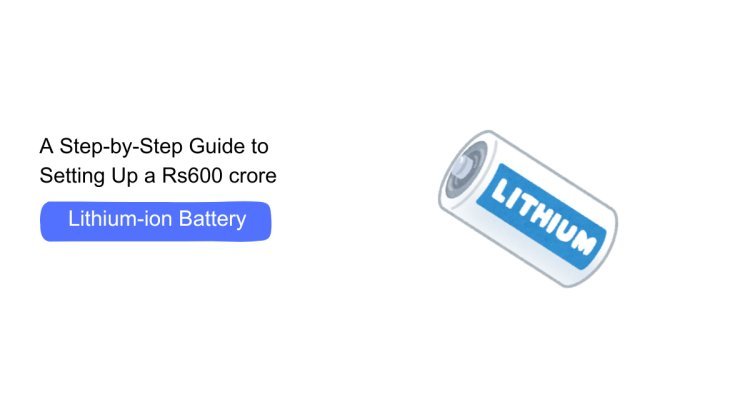A Step-by-Step Guide to Setting Up a Rs600 crore Lithium-ion Battery
The lithium-ion battery industry is booming, and with it comes the growing concern of responsible battery disposal. Lithium-ion battery recycling plants offer a sustainable solution to extract valuable materials and minimize environmental impact.

Setting Up a Rs. 600 Crore Lithium-Ion Battery Recycling Plant in India
The need for appropriate battery disposal is expanding along with the expansion of the lithium-ion battery industry. Recycling facilities for lithium-ion batteries provide an environmentally friendly way to retrieve valuable materials while reducing waste output. In case you're thinking about starting a business in this industry in India, here's a detailed guide to get you started:
1. Market Research and Business Plan:
- To comprehend the present state of lithium-ion battery recycling in India, conduct in-depth market research. Determine the market's current participants, evaluate the gap between supply and demand, and identify possible clientele (electric car makers, battery manufacturers, etc.).
- Create a thorough business plan that outlines the goals, objectives, target market, competitive advantage, marketing approach, and projected financials of your organization. Getting money and getting investors will depend heavily on this approach.
2. Legal and Regulatory Compliance:
- Obtain the required licenses and permits from government agencies such as the Central Pollution Control Board (CPCB) and the Ministry of Environment, Forests, and Climate Change (MoEFCC). These organizations oversee the handling of hazardous trash, which includes lithium-ion batteries.
- Familiarize yourself with environmental regulations specific to lithium-ion battery recycling in India. The Ministry of Electronics and Information Technology (MeitY) has published guidelines on e-waste management, which include provisions for battery recycling.
3. Location and Infrastructure:
- Choose a strategic location for your plant, considering factors like proximity to raw material sources (used batteries), transportation links, and availability of skilled labor. Industrial zones with existing infrastructure for handling hazardous materials might be suitable options.
- Invest in building a robust infrastructure that adheres to safety and environmental regulations. This includes designing a proper layout for segregated waste handling, fire safety measures, and pollution control equipment.
4. Technology Selection:
- Lithium-ion battery recycling involves various processes like mechanical shredding, hydrometallurgy, and pyrometallurgy. Research and select the most suitable technology based on factors like battery type, desired output materials (lithium, cobalt, nickel, etc.), and environmental footprint. There are different recycling technologies available, each with its advantages and limitations.
- Consider partnering with established technology providers or research institutions to ensure the adoption of the latest and environmentally friendly recycling methods.
5. Funding and Investment:
- It costs a lot of money to set up a recycling facility for lithium-ion batteries. Examine your possibilities for funding, including bank loans, grants from the government (if any), and venture capital funds.
- Create a compelling financial plan that emphasizes your venture's potential for profitability and the benefits it will bring to the environment.
6. Recruitment and Training:
- Building a skilled workforce is crucial for the successful operation of your plant. Recruit qualified engineers, technicians, and safety personnel with expertise in handling hazardous materials and battery recycling processes.
- Provide comprehensive training to your staff on safety protocols, operation procedures, and environmental best practices for lithium-ion battery recycling.
Final Thoughts:
In addition to offering a profitable commercial opportunity, the recycling of lithium-ion batteries in India encourages environmental responsibility. Through adherence to rules, comprehensive research, and step-by-step guidance, you may successfully construct a lithium-ion battery recycling plant in India and make a positive contribution to a more sustainable future.
What's Your Reaction?










![Blog Submission Sites 2024 [High DA]](https://blognow.co.in/uploads/images/202306/image_100x75_6494a03eaff5e.jpg)
![Article Submission Sites 2023 [High DA & PA]](https://blognow.co.in/uploads/images/202307/image_100x75_64c4181f17036.jpg)
![Classified Submission Sites 2023 [High DA & PR]](https://blognow.co.in/uploads/images/202306/image_100x75_649dcd5260808.jpg)




![Article Submission Sites 2023 [High DA & PA]](https://blognow.co.in/uploads/images/202307/image_750x415_64c4181f08ed5.jpg)
![Classified Submission Sites 2023 [High DA & PR]](https://blognow.co.in/uploads/images/202306/image_750x415_649dcd5247eeb.jpg)
![Blog Submission Sites 2024 [High DA]](https://blognow.co.in/uploads/images/202306/image_750x415_6494a03e96bfa.jpg)
